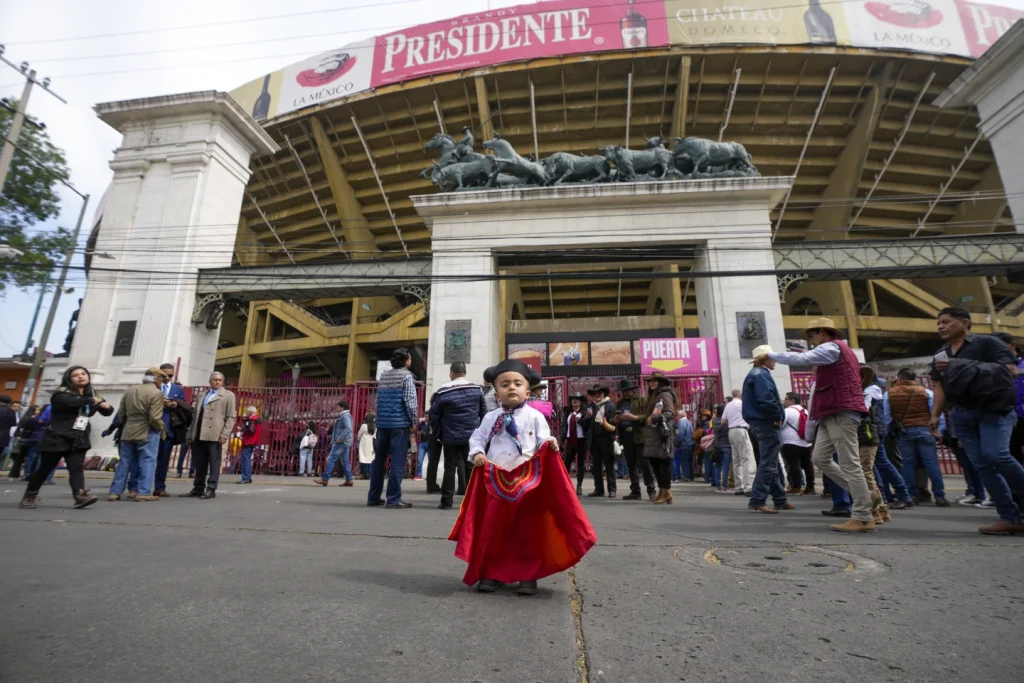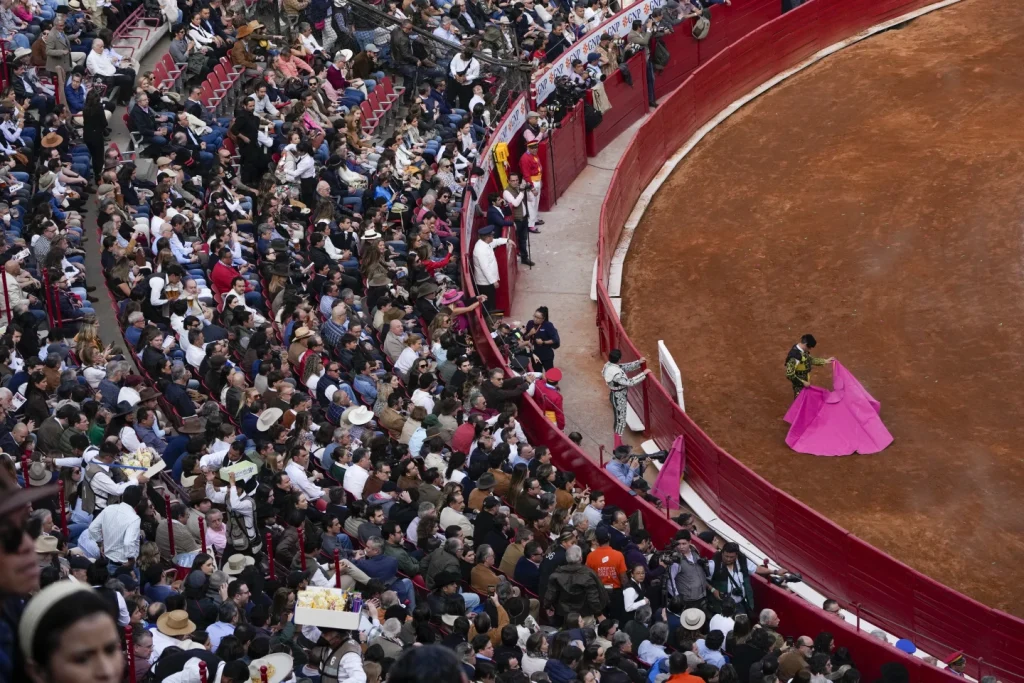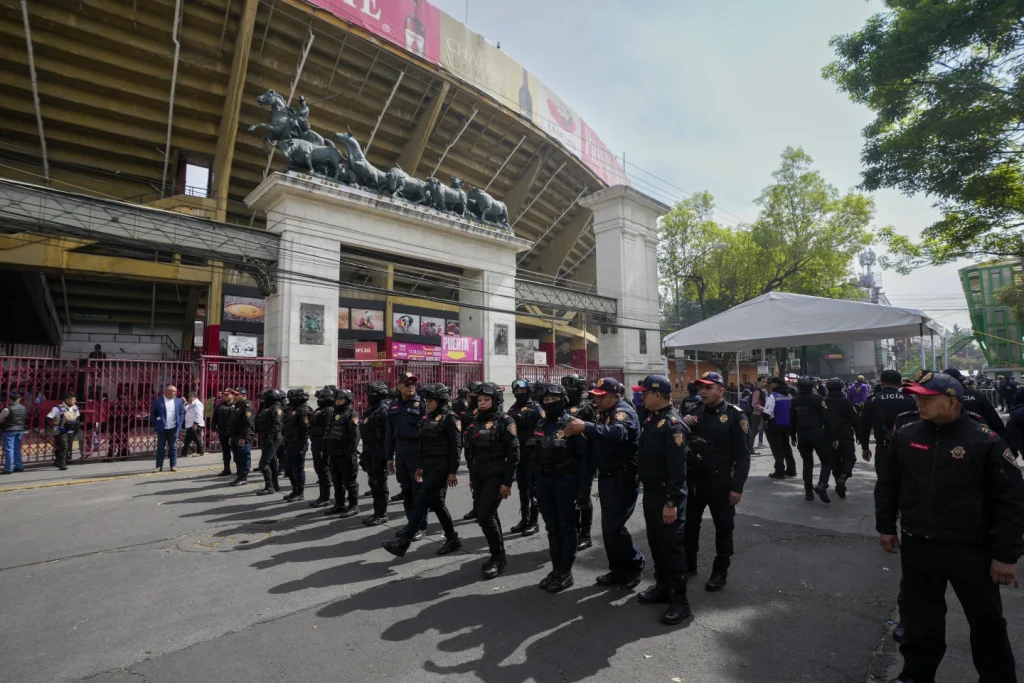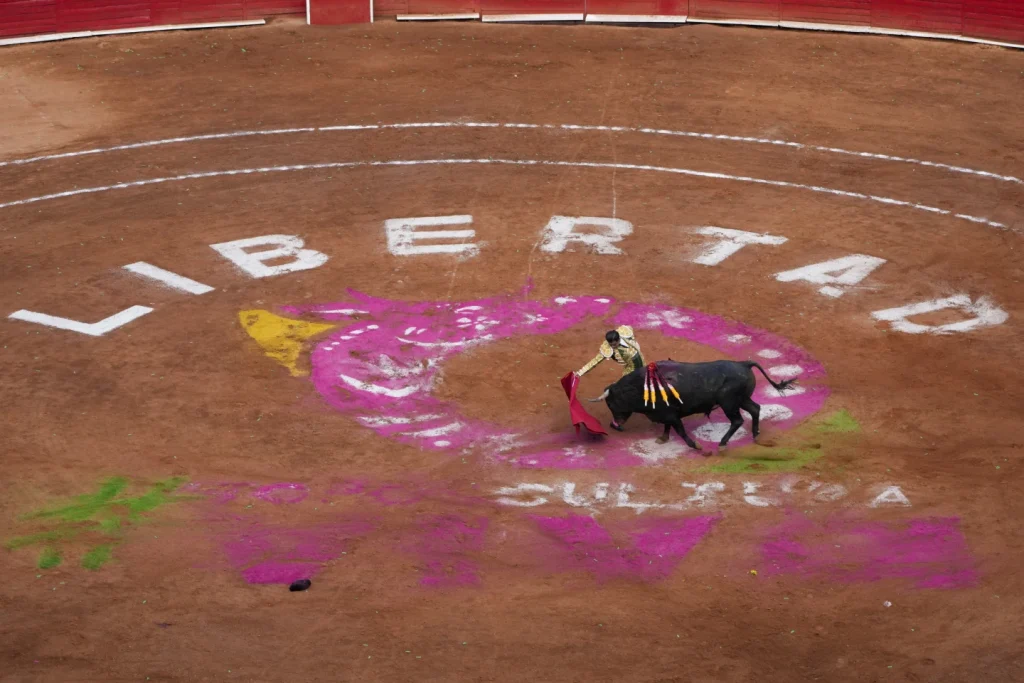The resumption of bullfights in Mexico City has sparked a contentious debate between animal rights activists and bullfighting enthusiasts.
The recent decision by the country’s highest court to temporarily revoke a local ruling that suspended bullfighting events for over a year and a half has reignited the ongoing legal battle surrounding this controversial practice.
With protesters gathering outside the Plaza México, the largest bullfighting arena in the world, tensions are running high as both sides of the argument make their voices heard.
For many fans of bullfighting, the resumption of events in the Plaza México has been met with great anticipation.
The return of renowned Mexican matador Joselito Adame to the ring was met with cheers and applause from the thousands of spectators in attendance.
The atmosphere was electric as the first bull entered the arena, with some individuals shouting “Long live freedom” in support of the tradition of bullfighting, also known as “fiesta brava” in Spanish.
However, the resumption of bullfights has also reignited the fierce debate surrounding the ethical and moral implications of this practice.
Animal rights defenders argue that bullfighting is a cruel and inhumane spectacle that violates the welfare of the animals involved.
They contend that the practice goes against the principles of animal rights and raises significant concerns about the ethical treatment of animals.

Furthermore, opponents of bullfighting argue that it also infringes upon people’s rights to a healthy environment, as the events can be distressing and traumatic for both animals and spectators alike.
The legal battle over the future of bullfighting in Mexico City is far from over, with both sides of the argument continuing to make their case in the courts.
The complex and contentious nature of this issue has resulted in a series of twists and turns, making it a highly polarizing and divisive topic within Mexican society.
Despite the passionate support for bullfighting from its enthusiasts, the resumption of events in the Plaza México has served as a catalyst for a broader conversation about the ethical treatment of animals and the cultural significance of traditional practices.
As the legal battle continues to unfold, it is clear that the debate surrounding bullfighting in Mexico City will remain a deeply contested and complex issue for the foreseeable future.
Hours before the formal commencement, a gathering of approximately 300 individuals assembled outside Plaza México to voice their opposition to bullfighting.
The atmosphere was charged as activists passionately chanted slogans such as “Murderers!” and “The plaza is going to fall!” while others expressed their dissent through rhythmic drumming and the display of signs bearing messages like “Bullfighting is sadism.”
Amidst this fervor, law enforcement officers equipped with shields maintained a vigilant presence. Although the protest was predominantly peaceful, sporadic moments of tension arose when certain activists resorted to hurling plastic bottles and stones.
Guillermo Sánchez, a vocal participant in the demonstration, raised poignant questions regarding the ethical implications of allowing bullfights to resume, emphasizing the harm inflicted upon the bulls.
Meanwhile, Alfredo Barraza, donning a paper mask resembling a bull, decried the decision to permit bullfighting as a regressive step in the ongoing struggle for animal rights.
He fervently expressed his aspiration for Mexico City to ultimately rid itself of such violent spectacles.
The resumption of bullfighting in Mexico City has sparked a mix of emotions and reactions from various groups, as the Plaza México welcomed a full crowd while activists protested outside.
Inside the Plaza, the atmosphere was described as festive, with attendees partaking in food, drinks, and capturing moments through photography.
The sentiment of excitement was expressed by individuals such as Aldo Palacios, who not only brought his family to witness the inaugural bullfight but also to celebrate his 42nd birthday.
The legal backdrop of this event is complex, with a local court initially ordering an end to bullfighting activities at Plaza México in response to an injunction from the civil organization Justicia Justa, which advocates for human rights.
However, the activities were allowed to resume due to a decision by the nation’s Supreme Court of Justice, which revoked the suspension while the case’s merits are being discussed. This decision is pending a final ruling on whether bullfights impact animal welfare.
Amidst this legal back-and-forth, another civil organization filed an appeal on animal welfare grounds in a last-ditch effort to prevent the resumption of bullfighting.

However, a ruling on this appeal was not anticipated before the scheduled event on Sunday. This legal battle reflects the ongoing tension between animal rights groups and bullfighting proponents in Mexico.
In recent years, the former have made significant strides, with judicial measures in various states imposing limitations on bullfighting activities.
The economic impact of these legal and social developments cannot be overlooked. Ranchers, businessmen, and fans of bullfighting argue that the ban on bullfights not only infringes upon their rights but also jeopardizes thousands of jobs associated with the activity.
They assert that bullfighting contributes significantly to Mexico’s economy, generating an estimated $400 million annually.
The National Association of Fighting Bull Breeders in Mexico further emphasizes the substantial employment opportunities tied to bullfighting, estimating 80,000 direct jobs and 146,000 indirect jobs.
In response to these challenges, the association has undertaken proactive measures to promote bullfights and attract a younger audience.

It has organized events and workshops in recent years, aiming to cultivate new fans and ensure the continuation of this traditional practice.
The resumption of bullfighting in Mexico City has reignited debates surrounding tradition, culture, animal welfare, and economic interests.
As these discussions unfold, they reflect the complex and multifaceted nature of societal values and priorities, underscoring the need for thoughtful consideration and dialogue on all sides.
